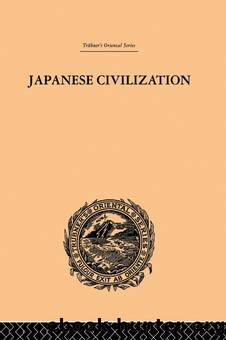Japanese Civilization, its Significance and Realization by Kishio Satomi

Author:Kishio Satomi [Satomi, Kishio]
Language: eng
Format: epub
ISBN: 9780415231886
Google: P0XDtAEACAAJ
Publisher: Routledge
Published: 2000-01-15T05:48:34+00:00
2. HIS BIRTH AND STUDIES
He was born on the 16th of the second month of the fourth year of Shokyu, which is just one year later than the Shokyu War. His father lived on the sea coast of Awa, a province of the eastern part of Japan, as a poor fisherman (Works, pp. 616, 792, 463, 1536, etc.)
His native village faces the Pacific Ocean and is near a quiet hill. He lived with his parents until he was twelve years of age. We are not intimately acquainted with the details of his family because he seldom wrote giving particulars. Of course, there are many traditions about his lineage and his childhood, but they do not affect his true life to any extent. We shall therefore omit them.
As years rolled on, this infant prodigy became distinct from all others, and when he became twelve years of age reason was beginning to bud in his mind. He gave vent to his great doubt concerning the contradictory facts of the country with regard to the most important things. What were they? According to one of his extant autographical manuscripts, he harboured two serious doubts, the one was about religion and the other about the Shokyu War, with reference to the Japanese National Principles and history. He writes in one of his letters:
âAs you know, I studied diligently from my boyhood, and I prayed to the Bodohisattova KokuzÅ since I was twelve years of age in order that I should be made the wisest man in Japan. But, for certain reasons, I cannot write about it minutely yetâ (Works (the Ryogonkaku Edition), Second Series, p. 88; the manuscripts in Nichirenâs own handwriting are extant. Cf. Works, p. 1543).
Buddhaâs true teaching must be one, though there exist thousands of different doctrines with pious-imposition; however, Buddhism in general was contradictory at that time. Nichiren, first of all very much questioned such Buddhism. In the second place, he could not neglect the Shokyu War which had happened one year before his birth. Why was the Sovereignâs army beaten by the Hojoâs? And why do not people doubt such a topsyturvy, a mere subject like Hojo Yoskitoki daring to expel the three ex-Emperors to islands? Without doubt, Nichiren wanted to solve these marvellous questions, so he made up his mind to go to the Buddhist Monastery to enable him to get at the root of such phenomena. He says:
âThe seven sects of Mahayanism sing their own praises as follows: Our Sect is the important essence of the whole Buddhism, etcâ¦. People say: We, common people, can be satisfied with any master or priest by believing him. It might be the best way to revere and believe any priest; but my, Nichirenâs, doubt has not been dispelled. Although every individual tries to get ahead of all others, yet the Sovereign must be one; if two Kings co-exist in one country there cannot be peace; if there are two masters in one home, then family dissensions will break out. It is not otherwise in Buddhism.
Download
This site does not store any files on its server. We only index and link to content provided by other sites. Please contact the content providers to delete copyright contents if any and email us, we'll remove relevant links or contents immediately.
Spell It Out by David Crystal(36109)
Life for Me Ain't Been No Crystal Stair by Susan Sheehan(35800)
Cecilia; Or, Memoirs of an Heiress — Volume 1 by Fanny Burney(32544)
Cecilia; Or, Memoirs of an Heiress — Volume 2 by Fanny Burney(31939)
Cecilia; Or, Memoirs of an Heiress — Volume 3 by Fanny Burney(31928)
The Great Music City by Andrea Baker(31915)
Professional Troublemaker by Luvvie Ajayi Jones(29648)
The Secret History by Donna Tartt(19039)
We're Going to Need More Wine by Gabrielle Union(19032)
Twilight of the Idols With the Antichrist and Ecce Homo by Friedrich Nietzsche(18619)
All the Missing Girls by Megan Miranda(15937)
Cat's cradle by Kurt Vonnegut(15330)
Pimp by Iceberg Slim(14481)
Bombshells: Glamour Girls of a Lifetime by Sullivan Steve(14048)
For the Love of Europe by Rick Steves(13890)
Talking to Strangers by Malcolm Gladwell(13344)
Norse Mythology by Gaiman Neil(13343)
Fifty Shades Freed by E L James(13231)
The Social Justice Warrior Handbook by Lisa De Pasquale(12184)
